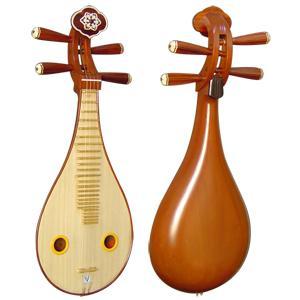The historical development of Liuqin
Liuqin was originally a popular folk musical instrument in Shandong, Anhui and Jiangsu. It is used as an accompaniment to local operas such as Liuqin Opera and Sizhou Opera and to play simple songs. After a long period of development, it has now developed into a solo instrument and is often used as a high instrument in national bands.
The earliest liuqin has a relatively simple structure, with only two silk strings and 7 frets made of sorghum stalks. At that time, the body of the violin was large. When playing, a bamboo tube was put on the index finger, which was pinched with the thumb, and the strings were plucked by swinging the wrist. The playing style was unique. After that, the bamboo cover is brittle and easy to crack, and the hollowed horn cylinder is used instead.
At the end of 1958, the first generation of a new type of liuqin, the sanxian liuqin, was born. The sanxian liuqin has changed from the original two strings to three strings, and the frets have also increased from 7 to 24. Compared with the local pipa, the new liuqin has expanded the range of sound, which is convenient for tuning, and the timbre is also brightened from muffled noise. In the 1970s, the second generation of new liuqin - four-string high-pitched liuqin appeared. In addition to the increase in the number of strings and frets, the second-generation new liuqin has the most important change in replacing sorghum stalks with bamboo and replacing silk strings with steel wires. These reforms have greatly improved the performance of the liuqin in all aspects and enriched its expressiveness. As a result, the liuqin ended its 200-year history as an accompaniment instrument and embarked on the development path of a solo instrument.

There are many theories about the origin of the liuqin:
1. In the 1860s, the soul-pulling artists in the southern part of Shandong Province modeled the pipa and the yueqin by hollowing out willow trees.
2. It was developed by a scholar surnamed Su, a local artist and woodworker in Sulou Village, Teng County.
3. Linyi Lahunqiang artists Wu Da and Wu Er imitated the pipa held by the Heavenly King of the State and created a 2-string soil for the pipa to play, sing and beg.
Today, liuqin plays various roles in the field of Chinese music performance. In the national band, the liuqin is a high-pitched instrument in the plucked instrument group. It has a unique sound effect and often plays an important theme in the high-pitched area. Because its timbre is not easy to be concealed and integrated by other instruments, it is sometimes used for the performance of highly skilled cadenza passages. In addition, the liuqin also has the sound effect of the Western musical instrument mandolin, which is unique in cooperation with Western bands.
 渝公网安备 50010702504639号
渝公网安备 50010702504639号